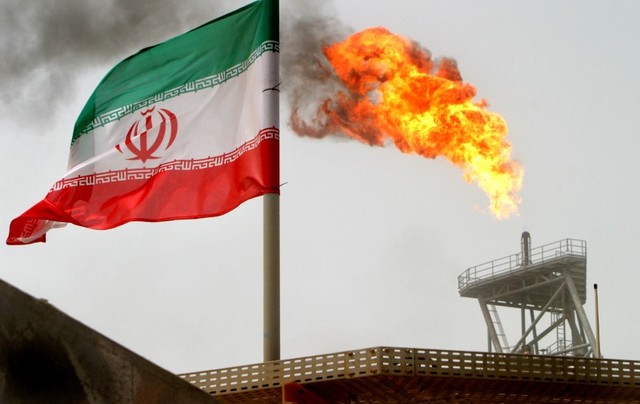Trump administration to impose 'toughest ever' sanctions on Iran beginning November 5
"On Monday, the Treasury Department will add more than 700 names to our list of blocked entities. This includes hundreds of targets previously granted sanctions relief under the JCPOA, as well as more than 300 new designations. This is substantially more than we ever have previously done," US Treasury Secretary Steven Mnuchin told reporters.

- Country:
- Iran Islamic Rep.
- United States
The Trump administration on Friday announced it would impose "toughest ever" sanctions on Iran beginning November 5 that it said is targeted at Tehran's economy with the intention that the authoritarian Iranian regime would change its behaviour.
"On Monday, the Treasury Department will add more than 700 names to our list of blocked entities. This includes hundreds of targets previously granted sanctions relief under the JCPOA, as well as more than 300 new designations. This is substantially more than we ever have previously done," US Treasury Secretary Steven Mnuchin told reporters.
Sanctions lifted under the terms of Iran's nuclear deal will be reimposed on individuals, entities, vessels and aircraft that touch numerous segments of Iran's economy. This will include Iran's energy sector and financial sectors, he said.
"We are sending a very clear message with our maximum pressure campaign: that the US intends to aggressively enforce our sanctions. Any financial institution, company or individual who evades our sanctions risks losing access to the US financial system and the ability to do business with the United States or US companies. We are intent on ensuring that global funds stop flowing to the coffers of the Iranian regime," Mnuchin asserted.
Describing it as a massive economic pressure campaign against Iran, which he alleged remains the world's largest state sponsor of terrorism, he said to date the US has issued 19 rounds of sanctions on Iran, designating 168 targets.
"We've gone after the financial networks that the Iranian regime uses to fuel its terrorist proxies in Hezbollah and Hamas, to fund the Houthis in Yemen, and to support the brutal Assad regime in Syria," he said.
Asserting that SWIFT is no different than any other entity, Mnuchin said that the US has advised SWIFT that the US Treasury will aggressively use its authorities as necessary to continue intense economic pressure on the Iranian regime and that SWIFT would be subject to US sanctions if it provides financial messaging services to certain designated Iranian financial institutions.
The Society for Worldwide Interbank Financial Telecommunication or SWIFT Code is a standard format of Bank Identifier Codes (BIC) and is a unique identification code for a particular bank. These codes are used when transferring money between banks, particularly for international wire transfers.
"We have advised SWIFT that it must disconnect any Iranian financial institution that we designate as soon as technologically feasible to avoid sanctions exposure," Mnuchin said.
At the same time, he said, humanitarian transactions to non-designated entities will be allowed to use the SWIFT messaging system as they have done before, but banks must be very careful that these are not disguised transactions, or they could be subject to certain sanctions.
The White House in a fact sheet said that together with the "unprecedented" action by the Trump administration, these will be the "toughest" sanctions regime ever imposed on Iran.
Sanctions will target critical sectors of Iran's economy, such as its energy, shipping, shipbuilding, and financial sectors, Mnuchin said.
Over 700 individuals, entities, vessels, and aircraft are going back onto its sanctions list, including major Iranian banks, oil exporters, and shipping companies, the White House said. The sanctions also target transactions with the Central Bank of Iran and designated Iranian financial institutions.
Sales of food, agricultural commodities, medicine, and medical devices to Iran have long been - and remain - exempt from US sanctions, the White House said, adding that reimposing sanctions will cut off revenues the regime uses to "bankroll terrorist groups, foment global instability, fund its nuclear and ballistic missile programme, and to enrich its leaders".
The White House asserted that the administration intends to fully enforce all US sanctions on Iran and will target those who attempt to violate or circumvent them.
"Those who have failed to wind down sanctionable activities with Iran risk severe consequences," it warned.
The US, it said, is confident that energy markets will remain well supplied despite Iranian oil export reductions. From August 2017 to August 2018, US crude oil production increased by 2.1 million barrels per day and exports increased by over 700,000 barrels per day, adding to market liquidity.
Over the next year, US production will increase by one million barrels per day or more, the White House said.
"We are working with oil producers around the world to increase their supply as well. As a result of this increased production, respected forecasters like the United States Energy Information Administration expect global oil supply to keep pace with demand in late 2018 and exceed demand in 2019," the White House said.
(With inputs from agencies.)
- READ MORE ON:
- Steven Mnuchin
- United States Secretary of Defense
- United States Department of Defense
- Hezbollah
- United States Secretary of State
- United States Department of State
- United States sanctions against Iran
- Tehran
- Tehran Conference
- Tehran Province
- United States
- Identifier
- Presidency of Donald Trump
- Politics of Iran
- Hamas
- United States Department of the Treasury
- Business News
- PTI News
ALSO READ
Israeli airstrikes pound Hamas terror sites
3 sons and three grandchildren of top Hamas leader are killed in Israeli airstrike in Gaza
Sons of Hamas leader Ismail Haniyeh killed in Israeli airstrike, Hamas media confirms
Three sons of Hamas leader Haniyeh killed in Israeli airstrike
Hamas leader Ismail Haniyeh accuses Israel of killing his sons in 'the spirit of revenge and murder,' reports AP.










